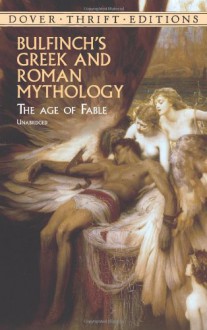
~~Moved from GR~~
The Age of Fable
by Thomas Bullfinch
No matter what other versions of the Greek myths you've read, there's a certain quaint charm to Bullfinch's take on the stories. Written in the 1850s, the book opens with a forward in which Bullfinch attempts to argue the value of mythology. He notes that without some background in mythology, the allusions of the famous poets will simply whizz over a reader's head, and also adds that despite its pagan beginnings, mythology contains pure and valuable moral lessons. He then proceeds to retell some of the most famous Greek stories, noting and laboriously explaining various later poetical allusions to each tale from writers such as Milton, Keats, Shakespeare, and more.
There's something rather precious about the Victorian writer's obvious discomfort with certain aspects of the myths. For one thing, Bullfinch has to work quite hard to extract his moral lessons; no matter how much you bowdlerize them, the major aesop of most Greek myths is, let's be honest, that you'd better "put out" whenever requested or someone is going to turn you into a tree. I also rather admire the complex feats of literary doublespeak that Bullfinch employs when handling the stories involving same-sex love; he does his best to either portray such relationships as (very) close "friendships" or simply obfuscates the pronouns. I had to laugh at his version of Sappho, as he tells the entire story without once revealing the gender of her lover.
I also found his emphasis rather interesting. The book is supposed to be a collection of myths and fables from around the world, yet almost the book focuses on Greek mythology (or, I suppose, Roman myths, as Bullfinch uses all the Roman names. Personally, I found that rather irritating as I had to keep translating them in my head.) After 35 chapters of Greek mythology, Bullfinch decides on a brief world tour--one chapter on Egyptian mythology, one chapter on "Eastern" mythology, three chapters on Norse mythology, and one chapter for the Celts. This actually can be seen as emblematic of the era; during Bullfinch's time, the Romans were venerated as having created a Utopian society that was lost to the dark ages, and--at least, according to the British--regained by Victoria's imperialistic regime. The fascination with Romans is then something of a self-congratulatory belief that the Victorian world recreated the splendour of the ancients.
Overall, Bullfinch's book exemplifies the Victorian attempt to both venerate and sterilize ancient folklore. Although perhaps not precisely true to their originals, I think Bullfinch's stories have a charm all their own.

 Log in with Facebook
Log in with Facebook 






